
Turkish Turmoil Adds Unpredictability to Putin’s Creeping Coup
Publication: Eurasia Daily Monitor Volume: 10 Issue: 109
By:

The explosion of public protests in Istanbul makes a strong but ambivalent impression on the development of the vacillating political crisis in Russia; the state-controlled Russian television channels prefer to give them minimal and unsympathetic coverage, focusing instead on the flooding in Prague or tornadoes in Oklahoma. A number of similarities can be found between the two regimes, and President Vladimir Putin values his personal chemistry with Prime Minister Recep Tayyip Erdogan (Polit.ru, June 3; Gazeta.ru, June 6). They may differ on intervening in the civil war in Syria, but the two see themselves as leaders of rising powers and they resent Western “lectures” on human rights—particularly from the West’s position of weakness, as the fruitless Russia–European Union summit last week demonstrated yet again (Kommersant, Nezavisimaya Gazeta, June 4). Putin saw Erdogan as a master of mobilizing the masses against the pro-Western liberals and is quite concerned about the entirely unexpected present turmoil, particularly because he really wants to avoid any new encouragement for the disunited but excitable “white opposition.”
Seeking to exploit the current lull in opposition activity to stage a decisive defeat by “perfectly democratic” means, Putin has opted to gamble on holding mayoral elections in Moscow already this September. Incumbent Moscow Mayor Sergei Sobyanin has, thus, loyally submitted his resignation (Kommersant, June 5). The assumption is that the motley crowd of opponents would not be able to nominate an electable candidate and launch a coherent campaign during the summer, so Sobyanin would easily win over a field of pathetic pretenders (Novaya Gazeta, June 4). The risk, however, is that through these elections, Moscow will concentrate a massive potential for political discontent. Moreover, Sobyanin’s control over the city bureaucratic machine is not as firm as his predecessor Yuri Luzhkov’s, who was fired scandalously in September 2010. An outsider in the dynamic metropolis, Sobyanin has not tried to endear himself to the skeptical Muscovites. And it is hardly a good sign for him that a fire paralyzed the crowded metro system exactly when he gave a meekly affirmative answer to Putin’s hypocritical question: “Do you plan to run in the elections?” (Moscow Echo, Kommersant, June 6).
Another and perhaps more dramatic political step was executed last week in the conflict-ridden North Caucasian republic of Dagestan, where Said Amirov, the mayor of Makhachkala, was arrested and air-lifted to Moscow for interrogation in a murder investigation (Moskovsky Komsomolets, June 6). Perfect irony blends with heavy risk in this cadre purge because Amirov, who was last year recognized as the best mayor in Russia—probably for securing the maximum vote for Putin in last year’s presidential election—is also the chief of an entrenched criminal clan and commands a relatively sizeable private army. So it took a large-scale operation by the special forces to capture him (Nezavisimaya Gazeta, June 4). This surprise attack signifies the Kremlin’s new resolution to suppress the low-intensity civil war in Dagestan fuelled by the feuds between ethno-political clans controlling a vast “shadow” economy (Novaya Gazeta, June 6). No public protests erupted against this forceful assertion of central authority, but it still might backfire, turning Amirov’s bodyguards into rebels and exacerbating grievances that can be exploited by Islamist extremists (Moscow Echo, June 6).
Moscow’s policy in the North Caucasus has started to suffer from a lack of resources for buying the loyalty of local elites—hence the turn to enforcing control by military means. But it also fits into Putin’s increasingly pronounced reliance on and empowerment of enforcers of various kinds known collectively as the siloviki. It is the Investigation Committee that spearheads this offensive, leveling charges against Amirov, building cases against such opposition activists as opposition blogger Alexei Navalny, and putting pressure on others, like economist Sergei Guriev, who opted to flee from Russia (Forbes.ru, May 31). Putin’s creeping coup, however, goes far beyond these investigations and amounts to curtailing all attempts to advance the modernization associated with Prime Minister Dmitry Medvedev and transforming the “enlightened” semi-democracy into a silovoki-dominated authoritarianism (Novaya Gazeta, June 3). Herein lies an important distinction with the political crisis in Turkey: Erdogan does not want to rely on the Kemalist army and seeks, instead, to consolidate his power base among the state bureaucracy and numerous lower-middle classes (Moskovsky Komsomolets, June 6).
It is also noticeable that in Istanbul the high numbers of the protests are dominated by youth groups, first of all students, while in Moscow with its dozens of universities, students remain reluctant to go into the streets (Nezavisimaya Gazeta, June 7). Teachers speak about risk-avoidance and an inherent conformism of the generation shaped by the hypocrisy of Putin’s “era.” While opinion polls show a high preference among students for finding career opportunities in the West (Moskovskie Novosti, May 31; Levada.ru, June 6). Nevertheless, many particular irritants are building up a critical mass of discontent among the Russian youth, including persistent if awkward attempts by the siloviki to introduce censorship of the Internet. Whereas, the rolling scandals related to shamelessly plagiarized doctorates focuses the youth’s disgust on one high-profile regime loyalist after another (Moscow Echo, June 7). The “demonstration effect” often works in peculiar, indirect ways, and Putin’s courtiers have no clue about the impression that the defiance of Turkish students in the face of brutal riot police has made on Russian university freshmen and sophomores.
In transferring power and responsibility to the siloviki, Putin is hardly following his political instincts that instruct him to preserve a balance between the multiple clans of his subordinates. Rather, he is acting on his complex and building angst. Putin is worried about another surge in opposition activity and is concerned about his falling approval ratings. He is being irked by Medvedev—who serves as a reminder about the existence of alternatives—and is irritated with liberal economists, who warn him about the stagnation of state capitalism. The Russian president is even unhappy with his family life—and all these anxieties translate into a desire to punish malcontents. What follows is the retreat toward anti-modern authoritarianism and a regression to a non-competitive monopolized economy, though Putin suspects that many of his subordinates are not ready to follow him into this dead end. The road to a police state is indeed entirely unappealing for those elites that have developed a taste for all the good things that money can buy, and they have good reason to suspect that the march of the siloviki would turn out to be a short one. Turkey has added to their apprehension that when discontent imperceptibly reaches a tipping point, any trivial injustice could become a trigger.




